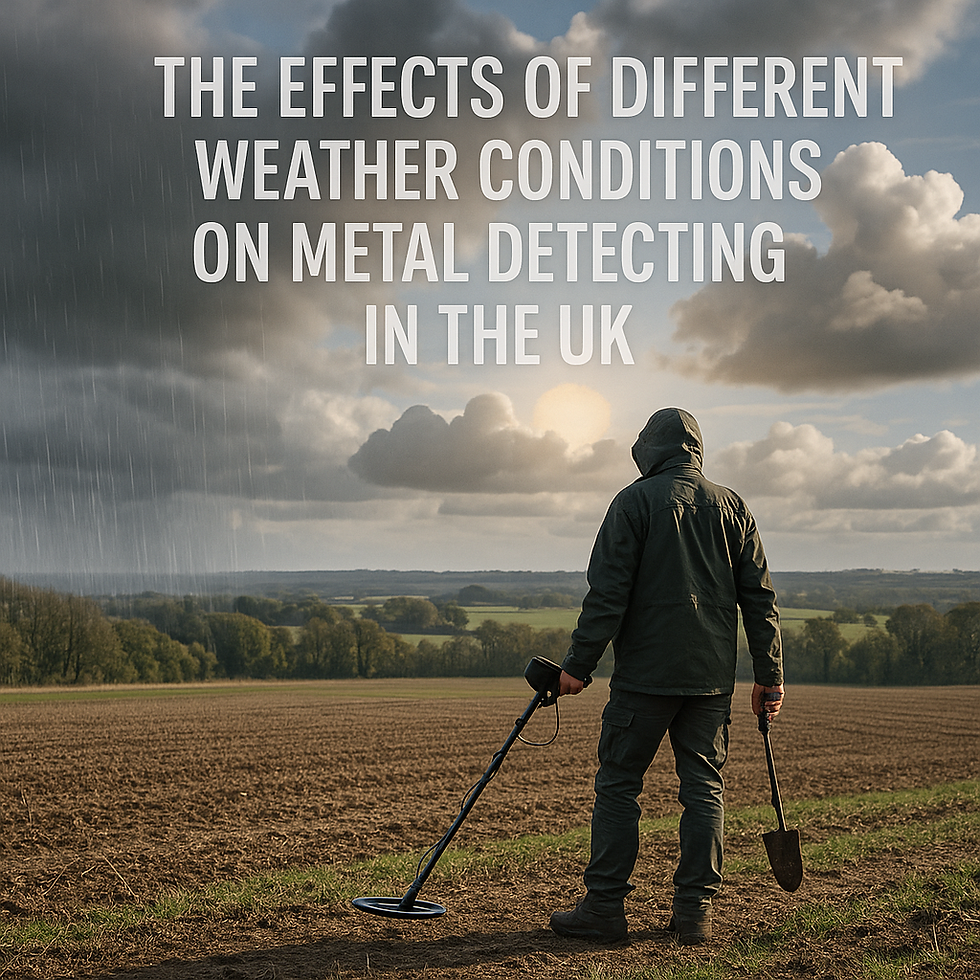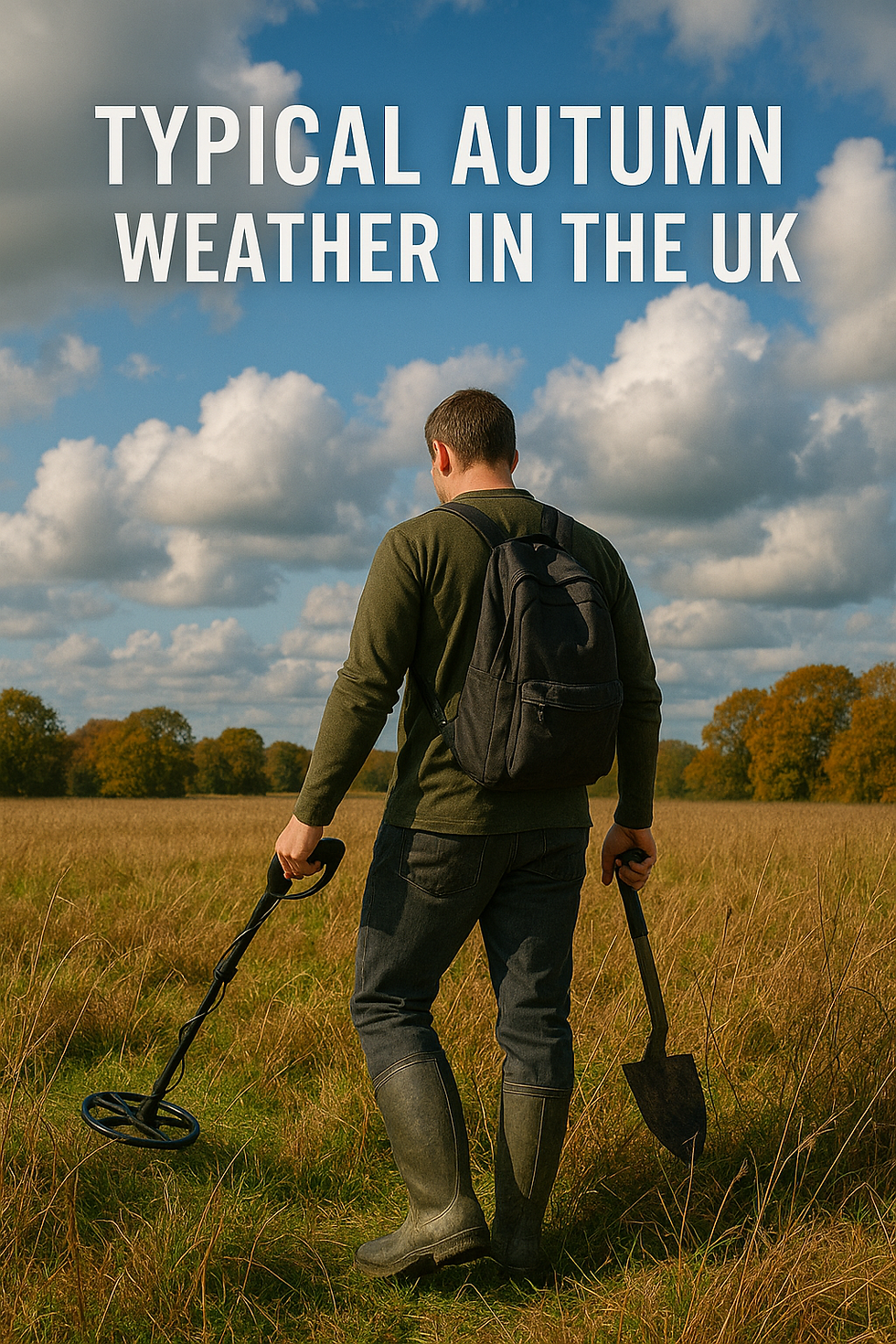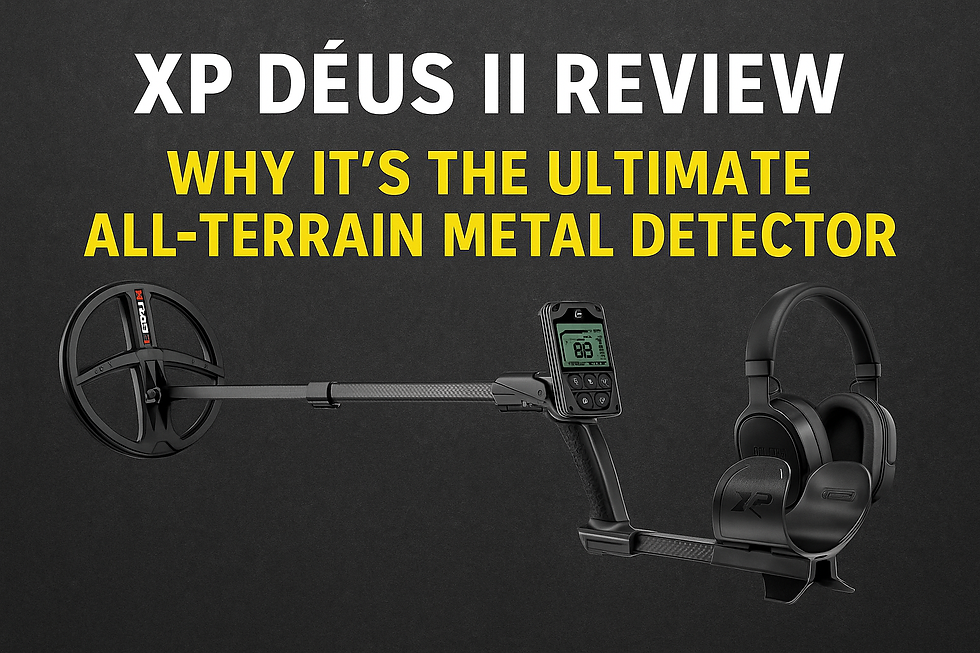Best Weather for Metal Detecting in the UK: Seasonal Tips and Conditions
- DiggingHistory.co.uk
- Sep 21
- 5 min read
Why Weather Matters for Metal Detecting
Metal detecting is one of the most rewarding hobbies in the UK, thanks to its rich history, diverse landscapes, and thousands of years of human settlement. But while the detector in your hand and the permissions in your pocket are vital, one factor is often overlooked: the weather.
Weather shapes soil conditions, digging comfort, and even the depth and clarity of signals. A detectorist who understands how seasons and weather conditions impact detecting can significantly increase their chances of success.
In this article, we’ll explore how spring, summer, autumn, and winter affect metal detecting in the UK, the role of rain, frost, and tides, and practical tips for making the most of the forecast.

Understanding Soil and Weather: The Science Behind Metal Detecting
Metal detectors work by sending electromagnetic signals into the ground and measuring their return when they hit a metal object. This process is influenced heavily by soil and weather conditions.
Key Factors:
Moisture: Moist soil conducts electricity better than dry soil. This increases depth penetration and signal clarity.
Dryness: Bone-dry fields scatter signals, reducing depth and sensitivity.
Frost: Frozen soil can block depth readings and make digging extremely difficult.
Mineralisation: Rainfall and temperature changes can alter soil chemistry, sometimes causing false signals.
This is why two hunts in the exact same field, one in summer drought and one after autumn rain, can produce completely different results.
Spring: A Season of Renewal and Opportunity

Spring is when many detectorists dust off their machines and head back into the fields. It’s one of the most promising seasons for finds.
Typical Spring Weather in the UK
Frequent showers and light rainfall
Increasing daylight hours
Softer soil after winter’s dampness
Fresh growth in fields and meadows
Why Spring Is Good for Detecting
Moist Soil: Signals travel deeper and smaller items are easier to detect.
Ploughed Fields: Farmers often plough fields in spring, exposing artefacts that were previously buried.
Comfortable Weather: Not too hot, not too cold, ideal for long sessions.
Tips for Spring Detecting
Focus on freshly ploughed and rolled fields.
Go out after light rain for the best soil conditions.
Use boots with good grip, spring fields can be muddy.
Spring Finds in the UK
Roman and Medieval coins turned up by the plough.
Artefacts like brooches, buckles, and trade tokens.
Wartime relics in training areas.
Summer: Long Days, Hard Ground

Summer in the UK brings long daylight hours and warm weather, but for land-based detectorists, it also brings challenges.
Typical Summer Weather in the UK
Warm to hot temperatures
Dry spells that harden the soil
Occasional thunderstorms
Busy beaches and holiday crowds
Why Summer Can Be Tricky
Dry Soil: Hard-baked fields reduce signal depth.
Tough Digging: Excavating in rock-hard earth is exhausting.
Heat: Longer hunts can risk dehydration and sunburn.
Summer Opportunities
Beaches: Constantly replenished by tides, beaches are treasure troves in summer.
Coastal Detecting: Storms and erosion reveal hidden finds.
Woodlands: Shaded ground retains more moisture, making them easier to detect in.
Tips for Summer Detecting
Detect early morning or evening to avoid the hottest hours.
Carry water, sunscreen, and a hat.
Prioritise beaches or shaded areas when fields are too dry.
Summer Finds in the UK
Modern coins, rings, and jewellery lost by beachgoers.
Older items washed out by coastal erosion.
Buttons, musket balls, and farm relics in woodland soils.
Autumn: The Detectorist’s Favourite Season

Many consider autumn the best season for metal detecting in the UK.
Typical Autumn Weather in the UK
Mild temperatures
Frequent rain showers
Soft, workable soil
Harvested fields opening up for permission hunts
Why Autumn Is Ideal
Harvest Time: Fields are clear, giving detectorists access to prime land.
Moist Soil: Excellent for conductivity without being waterlogged.
Cool Weather: Comfortable for long hunts with less risk of overheating.
Tips for Autumn Detecting
Seek permission for stubble fields right after harvest.
Detect after rainfall, but avoid overly saturated clay soils.
Keep waterproof boots and light rain gear handy.
Autumn Finds in the UK
Hammered silver coins exposed by ploughing.
Medieval and Tudor artefacts.
Brooches, buckles, and trade weights.
Winter: Cold Challenges, Unique Rewards

Winter detecting is tough, but for determined detectorists, it can be worth it.
Typical Winter Weather in the UK
Frequent rain and storms
Freezing conditions, sometimes with snow
Waterlogged or frozen ground
Challenges of Winter Detecting
Frozen Soil: Digging is almost impossible.
Hypothermia Risk: Wet, cold conditions can be dangerous.
Limited Access: Many fields are too muddy for detecting.
Opportunities in Winter
Flooded Riverbanks: Heavy rain shifts soil, exposing items.
Stormy Beaches: Winter storms strip sand away, revealing older finds.
Milder Days: Occasional breaks in the weather provide excellent detecting conditions.
Tips for Winter Detecting
Use waterproof kit, including covers for your detector.
Avoid frozen fields and target beaches or riverbanks.
Dress in layers and carry spare gloves and socks.
Winter Finds in the UK
Ancient relics revealed by river erosion.
Coins and jewellery uncovered by coastal storms.
Modern items lost in snow (often found in parks or playing fields).
The Role of Rain in Metal Detecting
Rain can be both friend and foe.
Light Rain or Damp Soil: Excellent conditions for depth and signal clarity.
Heavy Rain or Flooding: Can cause false signals or make fields unusable.
Post-Rain Hunts: 24–48 hours after rain is often the sweet spot.
Pro Tip: Avoid metal detecting during an actual downpour, moist soil is ideal, but rain on your machine and body makes for an unpleasant session.
Metal Detecting on Beaches: Tides and Weather
The UK coastline offers some of the best metal detecting opportunities, especially when weather plays its part.
Storms: High winds and waves strip away layers of sand, exposing long-hidden artefacts.
Tides: Low tide gives maximum coverage for detecting.
Wet vs Dry Sand: Wet sand improves conductivity and makes targets easier to detect.
Beach detecting is often best in winter and after storms, when natural erosion uncovers new treasures.
Safety Considerations in All Weather
Weather affects safety as much as detecting.
Summer: Watch for heatstroke, dehydration, and sunburn.
Winter: Guard against hypothermia and frostbite.
Wet Conditions: Beware of slips and trips in muddy or icy fields.
Storms: Never detect in thunderstorms, lightning is a real danger with a metal detector.
Seasonal Detecting Checklist
Spring: Moist soil, ploughed fields, Roman and Medieval coins.
Summer: Hard ground, beaches, modern jewellery.
Autumn: Best season overall, hammered coins, post-harvest fields.
Winter: Storm beaches, floodplains, erosion-exposed finds.
FAQs
What is the best weather for metal detecting in the UK?
Moist soil after light rain is the best condition for depth and signal clarity.
Can you metal detect in winter?
Yes, but avoid frozen fields. Focus on riverbanks, beaches, and erosion sites.
Does rain improve metal detecting?
Yes. Damp ground enhances signals, though oversaturation can reduce accuracy.
Which season is best for metal detecting in the UK?
Autumn is widely considered the best due to mild weather and harvested fields.
Is it better to detect on wet or dry sand?
Wet sand is better for conductivity and depth.
Weather is the Detectorist’s Secret Weapon
Metal detecting in the UK is a year-round hobby, but each season has unique pros and cons. Spring offers ploughed fields and moist soil. Summer brings long days and busy beaches. Autumn delivers the best balance of soil, weather, and access. Winter, though tough, rewards those who brave the elements with storm-exposed treasures.
The key is to use the weather to your advantage. Check forecasts, watch for rainfall, and choose your sites accordingly. With this knowledge, you’ll not only enjoy your time detecting but also increase your chances of uncovering that next great find.
Thanks for reading! If you found this guide useful, please share it with fellow detectorists and help spread the word about the impact of weather on metal detecting in the UK.





Comments